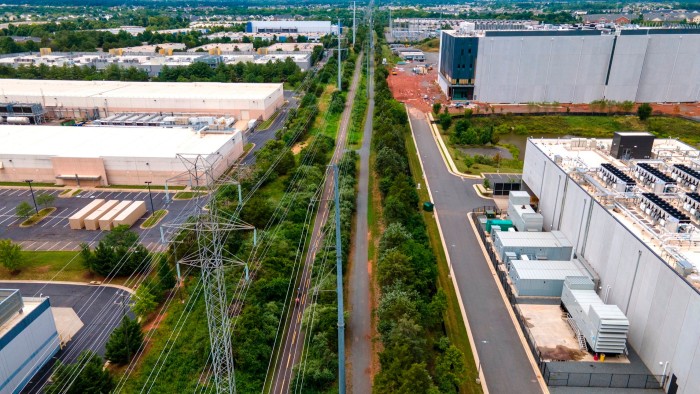Hello and welcome to Energy Source, coming to you from New York.
OpenAI has made another move to accelerate the development of new data centres, announcing a partnership with chipmaker AMD that could lead to it taking a 10 per cent stake in the company over time. The ChatGPT maker will buy tens of billions of dollars’ worth of AMD chips to power new data centres.
As the artificial intelligence boom picks up steam, private equity is getting involved in the action.
My colleagues Ivan Levingston and Antoine Gara reported that French investment firm Ardian struck a deal to acquire one of Ireland’s largest energy utilities for more than €2.5bn. Buyout groups have also snapped up utilities in the US.
That’s the topic of today’s Energy Source, where we look at how Wall Street has increased acquisitions of utilities as it aims to benefit from the surge in energy demand driven by AI data centres. — Alexandra
Why private equity is betting big on utilities
As US utilities navigate rising power demand and the need for fresh capital to modernise the grid, private equity firms have taken notice and swooped in to make acquisitions and invest in the sector.
Once considered a sleepy industry, utilities have become popular with Wall Street as investors seek to profit from rising energy demand, especially from technology companies in desperate need of electricity for AI data centres.
Power demand had been flat for nearly two decades but US electricity prices have increased faster than the rate of inflation since 2022, according to the US Energy Information Administration. It expects prices to continue increasing through 2026, with the average US electricity price rising 13 per cent from 2022 to 2025.
“[Utilities are] a growth business these days. Everybody wants power,” said Gregory Brown, a professor specialising in private equity and other alternative assets at the University of North Carolina’s Kenan-Flagler Business School.
Blackstone Infrastructure in May made a deal to acquire local utility TXNM Energy for $11.5bn. Last week, BlackRock-owned Global Infrastructure Partners announced it was nearing a $38bn deal to take over utility group AES, which would be the largest infrastructure takeover of all time. But that is not the first deal GIP has made in the sector. The group last year moved to acquire Allete, the parent of utility Minnesota Power, with Canada Pension Plan Investment Board, for $6.2bn.
Although the deal faced community pushback over concerns about higher electricity prices, the Minnesota Public Utilities Commission approved it unanimously on Friday. As Blackstone awaits approval from regulators in Texas and New Mexico, where TXNM Energy operates, the Allete deal may be a bellwether for further acquisitions in the sector.
Infrastructure has been a target of private equity firms for years and data centre growth has only strengthened demand for energy-related infrastructure. Utilities are also attractive to investors because they are considered a stable investment that tend to operate as regulated monopolies.
“The [utility] business model allows long-term predictable cash flows,” said Gautam Jain, a senior research scholar at the Center on Global Energy Policy at Columbia University. Utilities are allowed to keep a percentage of what they invest in, typically 8 per cent to 10 per cent, as earnings, he added.
AI has driven much of the excitement around utilities with some investors expecting a larger rate of return. Rodney Rebello, portfolio manager and vice-president at Reaves Asset Management, said over the next few years some utilities are well positioned to have growth accelerate to high single digits and in some cases double digits.
“There is this notion that [utilities] could be seen as AI beneficiaries,” he said. “The demand for power is . . . causing a sector that already had a lot of favourable attributes to have growth that is in some cases comparable to the broader market as a whole.”
According to data from PitchBook, private equity exit activity — when a firm realises a return on its investment — in US utilities jumped to $14.6bn this year, up from only $430mn and $3.16bn in 2024 and 2023, respectively.
But not everyone is enthusiastic about private equity’s recent activity.
Households and businesses take on the capital costs that utilities spend on infrastructure upgrades, as well as higher electricity prices. Some worry private equity could further drive up power bills.
“Private equity has developed a reputation of being opportunistic investors,” said Alissa Schafer, climate and energy director at the Private Equity Stakeholder Project, a group that is critical of the buyout industry. “Access to electricity is something that people need every day . . . It is concerning if the primary motivation for the company running it is to get as much money as possible.”
The Allete deal in Minnesota faced opposition from the state attorney-general, environmentalists, consumer advocates and industrial electricity buyers. Opponents of the deal cited the 19 per cent premium BlackRock paid for the Minnesota Power parent and warned Allete could take on extra debt that will cause its cost of capital to rise. This would result in higher rates for households and businesses.
“This approval comes over the clear objections of consumer advocates and utility customers,” said Karlee Weinmann, research and communications manager at Energy and Policy Institute, a watchdog organisation that advocates for clean energy and opposed the Allete deal.
“Regulators have now made a big bet that BlackRock’s ownership of Allete will yield much different results than private equity typically delivers. Evidence on the record suggests otherwise.”
Regulated utilities need approval to raise prices for its ratepayers, which some analysts and investors expect to act as a mediator between company and consumer interests. Regardless of who owns the utility, rising energy demand will cause US households and businesses to face higher electricity costs in the future.
Jain said: “The prices are going to go up no matter who the investors are.” (Alexandra White)
Power Points
-
The president of Shell USA criticised the Trump administration’s decision to halt fully permitted wind energy projects and called for more predictable regulation.
-
Experts warn the technology behind the small nuclear reactors intended to power the AI boom is too costly to be viable.
-
The CEOs of Shell and TotalEnergies have warned the US is expanding its capacity to export liquefied natural gas at such a rapid pace that it risks flooding the market and driving down prices.
Energy Source is written and edited by Jamie Smyth, Martha Muir, Alexandra White, Kristina Shevory, Tom Wilson, Rachel Millard and Malcolm Moore, with support from the FT’s global team of reporters. Reach us at energy.source@ft.com and follow us on X at @FTEnergy. Catch up on past editions of the newsletter here.
Recommended newsletters for you
Moral Money — Our unmissable newsletter on socially responsible business, sustainable finance and more. Sign up here
The Climate Graphic: Explained — Understanding the most important climate data of the week. Sign up here
Source link









